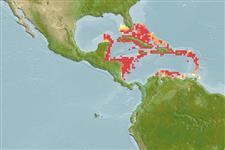Environment: milieu / climate zone / depth range / distribution range
पारिस्थितिकी
समुद्री प्रवाल-भित्ति संयुक्त; गहराई सीमा 5 - 70 m (Ref. 5521). Tropical
Western Central Atlantic: Bahamas and Virgin Islands south to Bonaire and west to Belize.
आकार / वज़न / Age
Maturity: Lm ? range ? - ? cm
Max length : 6.4 cm TL पुल्लिंग / अलिंग; (Ref. 5521)
पृष्ठीय रीढ़ (सम्पूर्ण) : 21 - 22; पृष्ठीय सौफट रेज़ (सम्पूर्ण) : 11 - 13; गुदा कांटा: 2; ऐनल सौफट रेज़: 20 - 23. Upper side has series of dark blotches; lower side has series of diamond-shaped markings (Ref. 26938). Males light brown, finely spotted with white, with an upper row of seven irregular dark-edged brown blotches and a lower row of ten smaller brown blotches of irregular diamond shape with pale centers; females have brownish orange blotches instead of dark brown (Ref. 13442).
Inhabit patch reefs or other deeper water coral formations. Usually associated with Condylactis gigantea (Ref. 9710).
Life cycle and mating behavior
Maturities | पुनरुत्पत्ति | Spawnings | Egg(s) | Fecundities | लार्वा
Böhlke, J.E. and C.C.G. Chaplin, 1993. Fishes of the Bahamas and adjacent tropical waters. 2nd edition. University of Texas Press, Austin. (Ref. 5521)
IUCN Red List Status (Ref. 130435)
Threat to humans
Harmless
Human uses
साधन
Special reports
Download XML
इंटरनेट स्रोत
Estimates based on models
Preferred temperature (Ref.
123201): 25.4 - 28.1, mean 27.6 °C (based on 104 cells).
Phylogenetic diversity index (Ref.
82804): PD
50 = 0.5000 [Uniqueness, from 0.5 = low to 2.0 = high].
Bayesian length-weight: a=0.00912 (0.00399 - 0.02083), b=3.06 (2.87 - 3.25), in cm total length, based on LWR estimates for this (Sub)family-body shape (Ref.
93245).
Trophic level (Ref.
69278): 3.4 ±0.4 se; based on size and trophs of closest relatives
Fishing Vulnerability (Ref.
59153): Low vulnerability (10 of 100).
Nutrients (Ref.
124155): Calcium = 123 [66, 225] mg/100g; Iron = 0.811 [0.479, 1.340] mg/100g; Protein = 18.6 [17.5, 19.7] %; Omega3 = 0.188 [0.109, 0.317] g/100g; Selenium = 23.9 [11.5, 46.7] μg/100g; VitaminA = 228 [73, 695] μg/100g; Zinc = 2.17 [1.46, 3.10] mg/100g (wet weight);
